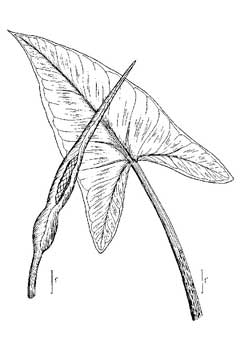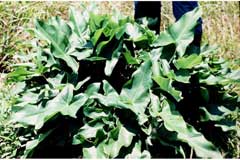 |
|
USDA-NRCS PLANTS Database / USDA NRCS. Wetland flora: Field office illustrated guide to plant species. USDA Natural Resources Conservation Service. |
 |
| Robert H. Mohlenbrock @ USDA-NRCS PLANTS Database / USDA SCS. 1991. Southern wetland flora: Field office guide to plant species. South National Technical Center, Fort Worth, TX. |
Translate this page:
Summary
Physical Characteristics

 Peltandra virginica is a PERENNIAL growing to 0.3 m (1ft).
Peltandra virginica is a PERENNIAL growing to 0.3 m (1ft).
See above for USDA hardiness. It is hardy to UK zone 5. It is in flower in June. The species is monoecious (individual flowers are either male or female, but both sexes can be found on the same plant).
Suitable for: light (sandy), medium (loamy) and heavy (clay) soils. Suitable pH: mildly acid and neutral soils. It cannot grow in the shade. It prefers wet soil and can grow in water.
UK Hardiness Map
US Hardiness Map
Synonyms
P. undulata.
Plant Habitats
Pond; Bog Garden;
Edible Uses
Edible Parts: Flowers Root Seed
Edible Uses:
Seed - cooked. A slightly sweetish flavour, resembling parched corn[183]. A bread can be made from the dried and powdered seeds, it tastes like corncake with a strong flavour of cocoa[183]. Spadix (the flowering stem) and berries - cooked[2, 46, 61, 105]. A great delicacy, but they must be very well cooked otherwise they are poisonous[207]. The Indians would boil them for 9 hours[207]. Root - must be well cooked in order to destroy an acrimonious principle, see the notes above on toxicity[95]. The root is rich in starch[2, 46, 57, 61, 105] and can weigh up to 2.7 kilos[95]. It is highly astringent and has an unpleasant flavour[159]. The root can be dried and ground into a powder for use when making bread, soups etc[207].
References More on Edible Uses
Medicinal Uses
Plants For A Future can not take any responsibility for any adverse effects from the use of plants. Always seek advice from a professional before using a plant medicinally.
None known
References More on Medicinal Uses
The Bookshop: Edible Plant Books
Our Latest books on Perennial Plants For Food Forests and Permaculture Gardens in paperback or digital formats.

Edible Tropical Plants
Food Forest Plants for Hotter Conditions: 250+ Plants For Tropical Food Forests & Permaculture Gardens.
More

Edible Temperate Plants
Plants for Your Food Forest: 500 Plants for Temperate Food Forests & Permaculture Gardens.
More

More Books
PFAF have eight books available in paperback and digital formats. Browse the shop for more information.
Shop Now
Other Uses
References More on Other Uses
Cultivation details
Requires a wet lime-free humus-rich soil by the side of water or in shallow still or slowly flowing water in a sunny position[200]. Plants are best grown in clumps[1].
References Carbon Farming Information and Carbon Sequestration Information
Temperature Converter
Type a value in the Celsius field to convert the value to Fahrenheit:
Fahrenheit:
The PFAF Bookshop
Plants For A Future have a number of books available in paperback and digital form. Book titles include Edible Plants, Edible Perennials, Edible Trees,Edible Shrubs, Woodland Gardening, and Temperate Food Forest Plants. Our new book is Food Forest Plants For Hotter Conditions (Tropical and Sub-Tropical).
Shop Now
Plant Propagation
Seed - best sown as soon as it is ripe in late summer in pots of soil that are submerged to their rims in water[200]. When they are large enough to handle, prick the seedlings out into individual pots and grow them on in trays of water in the greenhouse for their first winter. Plant them out into their permanent positions in late spring or early summer, after the last expected frosts. Division in spring[200]. Larger divisions can be planted out direct into their permanent positions. We have found that it is better to pot up the smaller divisions and grow them on in light shade in a cold frame until they are well established before planting them out in late spring or early summer. Stem cuttings rooted in wet mud in the summer[200].
Other Names
If available other names are mentioned here
Native Range
NORTHERN AMERICA: Canada (Québec (southwest), Ontario (south)), United States (Connecticut, Indiana, Maine, Massachusetts, Michigan, New Hampshire, New Jersey, New York, Ohio, Pennsylvania, Rhode Island, Vermont, West Virginia, Iowa, Kansas (southeast), Minnesota (northeast), Missouri (southeast), Illinois, Oklahoma (southeast), Wisconsin, Alabama, Arkansas, Delaware, District of Columbia, Florida, Georgia, Kentucky, Louisiana, Maryland, Mississippi, North Carolina, South Carolina, Tennessee, Virginia, Texas)
Weed Potential
Right plant wrong place. We are currently updating this section.
Please note that a plant may be invasive in one area but may not in your area so it's worth checking.
Conservation Status
IUCN Red List of Threatened Plants Status :

Growth: S = slow M = medium F = fast. Soil: L = light (sandy) M = medium H = heavy (clay). pH: A = acid N = neutral B = basic (alkaline). Shade: F = full shade S = semi-shade N = no shade. Moisture: D = dry M = Moist We = wet Wa = water.
Now available:
Food Forest Plants for Mediterranean Conditions
350+ Perennial Plants For Mediterranean and Drier Food Forests and Permaculture Gardens.
[Paperback and eBook]
This is the third in Plants For A Future's series of plant guides for food forests tailored to
specific climate zones. Following volumes on temperate and tropical ecosystems, this book focuses
on species suited to Mediterranean conditions—regions with hot, dry summers and cool, wet winters,
often facing the added challenge of climate change.
Read More
Expert comment
Author
(L.)Schott.
Botanical References
43200
Links / References
For a list of references used on this page please go here
Readers comment
| Add a comment |
|
If you have important information about this plant that may help other users please add a comment or link below. Only comments or links that are felt to be directly relevant to a plant will be included. If you think a comment/link or information contained on this page is inaccurate or misleading we would welcome your feedback at [email protected]. If you have questions about a plant please use the Forum on this website as we do not have the resources to answer questions ourselves.
* Please note: the comments by website users are not necessarily those held by PFAF and may give misleading or inaccurate information.
To leave a comment please Register or login here All comments need to be approved so will not appear immediately.
|
Subject : Peltandra virginica
|
|
|
|